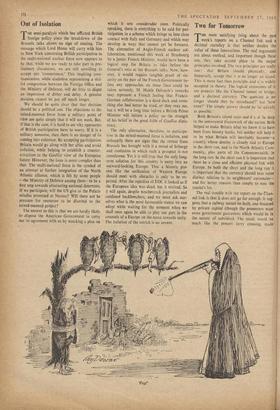Out of Isolation
TtiE semi-paralysis which has afflicted British foreign policy since the breakdown of the Brussels talks shows no sign of abating. The message which Lord Home will carry with him to New York concerning British participation in the multi-national nuclear force now appears to be that, while we are ready to take part in pre- liminary discussions, we are still unwilling to accept any 'commitment.' This inspiring com- munication, while doubtless representing a skil- ful compromise between the Foreign Office and the Ministry of Defence, will do little to dispel an impression of dither and delay. A genuine decision cannot be put off much longer.
We should be quite clear that that decision should be a political one. The objections to the mixed,-manned force from a military point of view are quite simply that it will not work. But, if that is the case, it is hard to see why opponents of British participation have to worry. If it is a military nonsense, then there is no danger of its coming into existence. By accepting participation 'Britain would go along with her allies and avoid isolation, while helping to establish a counter- attraction to the Gaullist view of the European future. However, the issue is more complex than that. The multi-national force is the symbol of an attempt at further integration of the North Atlantic alliance, which is felt by some people —the Ministry of Defence among them—to be a first step towards eliminating national deterrents. If we participate, will the US give us the Polaris missiles promised at Nassau? Will there not be pressure for resources to be diverted to the mixed-manned project?
The answer to this is that we are hardly likely to dispose the American Government to carry out its agreement with us by wrecking a plan on' which it sets considerable store, Politically speaking, there is everything to be said for par- ticipation in a scheme which brings us into close contact with Italy and Germany and which may develop in ways that cannot yet be foreseen. The alternative of Anglo-French nuclear col- laboration, mentioned this week at Strasbourg by a junior French Minister, would have been a logical step for Britain to take before the General's veto at the Brussels talks. Now, how- ever, it would require tangible proof of sin- cerity on the part of the French Government be- fore any approaches on these lines could be taken seriously. M. Habib Deloncle's remarks may represent a French feeling that Franco- German collaboration is a dead duck and some- thing else had better be tried, or they may not, but it will be a long time before a British Prime Minister will initiate a policy on the strength of his belief in the good faith of Gaullist diplo- macy.
The only alternative, therefore, to participa- tion in the mixed-manned force is-isolation, and unhappily there are signs that the retreat from Brussels has brought with it a mood of lethargy and confusion in which such a prospect is not unwelcome. Yet it is still true that the only long- term solution for this country is entry into an outward-looking Europe. That a historic pro- cess like the unification of Western Europe should meet with obstacles is only to be ex- pected. After the rejection of EDC it looked as if the European idea was dead, but it revived. So it will again, despite weathercock journalists and confused backbenchers, and we must ask our- selves what is the most favourable stance we can adopt while waiting for the moment when we shall once again be able to play our part in the counsels of a Europe on the move towards unity. The isolation of the ostrich is no answer.


































 Previous page
Previous page